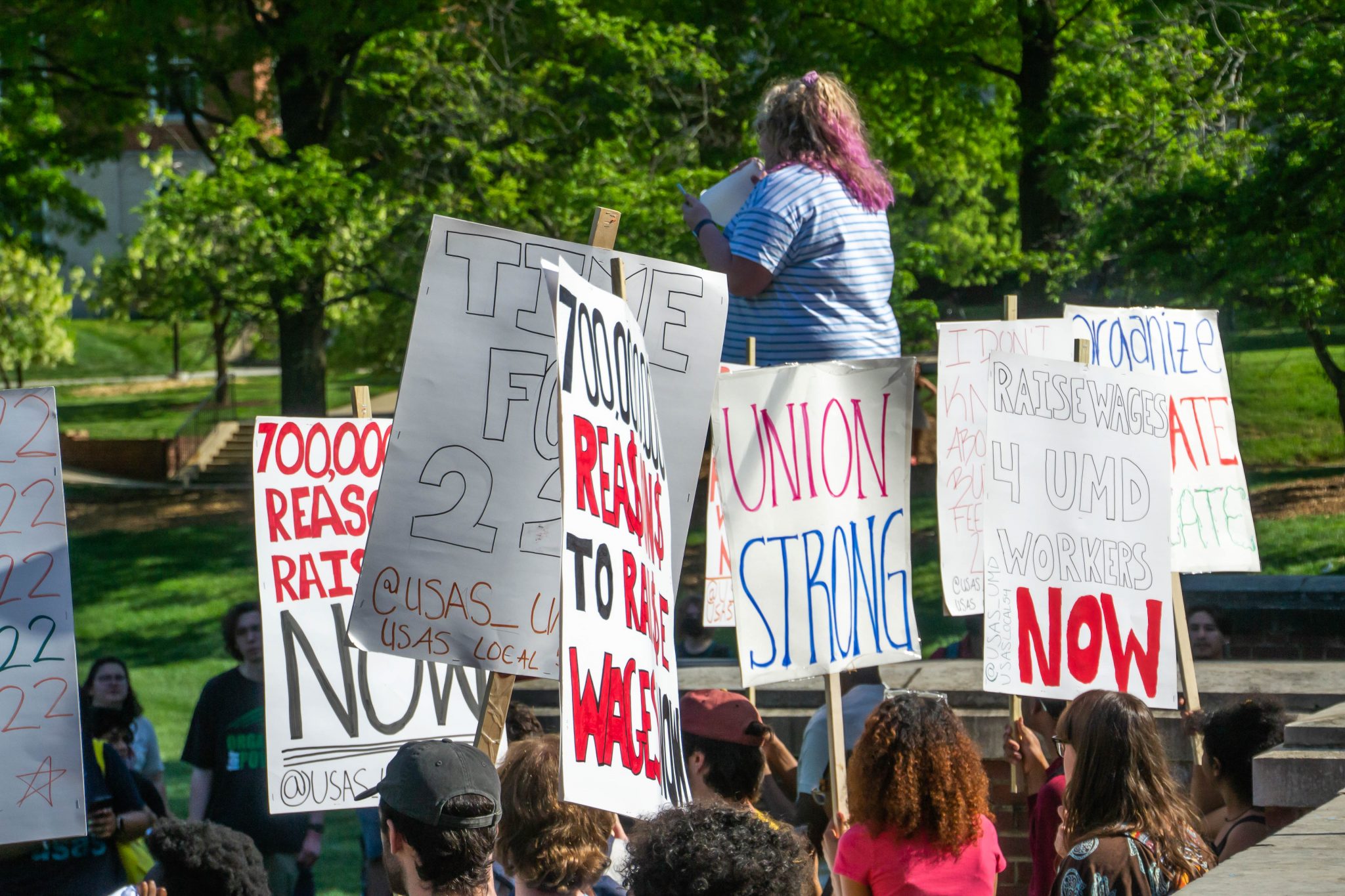The University of Maryland’s chapter of United Students Against Sweatshops Friday held a rally on McKeldin Mall to advocate for a $22.65 per hour minimum wage for this university’s employees.
Friday’s rally was part of the organization’s “Time For 22” movement, an initiative that also aims to secure the right to unionize for all employees at public universities in Maryland. The event included attendees from other local and on campus labor organizations such as Fearless Student Employees, American Federation of State, County and Municipal Employees Local 1072 and this university’s chapter of the Association of American University Professors.
This university’s USAS president Kelsey Coleman, a senior Black liberation studies and performing arts major, hoped Friday’s event would foster togetherness and unity among labor rights advocates.
“We must stand together,” Coleman said. “We must stand united and we must fight for labor democracy.”
Increasing stipends for graduate assistants should be a priority moving forward for this university, according to Carolyn Robbins, a doctoral communication student and member of FSE.
“The administration knows that this university mistreats [graduate students],” Robbins said. “They know that we are overworked, underpaid, abused by faculty mentors.”
The “Time For 22” movement aims to meet not just the demands of graduate assistants, but all university employees.
Sabrina Li, a senior psychology major, said that employees at Stamp Student Union and dining areas on campus are often mistreated and underpaid.
[UMD SGA executive candidates emphasize student well-being, sustainability in debate]
“[Employees are] are placed under these intense sort of pressures and hierarchies and stresses and they are simply just not getting paid for it,” Li said.
In recent years, the University System of Maryland has made several changes to employee wages.
This university raised the minimum wage for employees to $15 per hour following USAS’ “Pay Up Pines” campaign in 2021. Then, in 2022, University System of Maryland employees received three cost-of-living adjustment increases, including two merit increases and a $1,500 bonus. The merit increases included a 2.5 percent increase in January for employees with performance reviews of “meets standards” or better, and an additional 2.5 percent increase in July for employees who continued to meet the standard.
“These [wage increases] did not happen by accident,” university President Darryll Pines told The Diamondback. “They were requested and advocated for by administration, by the University System of Maryland because we all deeply care about our workforce.”
Pines said the pay increases across this university over the last 24 months have been unprecedented.
But some USAS members still argue the recent increases do not go far enough.
“It might be unprecedented that these increases have come, but it is unprecedented because workers are struggling together in a way that people have never seen before,” Coleman said.
USAS staff member Makayla Heiser urged the university to raise the minimum wage to $22.65 per hour, which is above the living wage for a single adult living in Prince George’s County without dependents, according to the MIT Living Wage Calculator.
[Rafael Lorente named next dean of UMD journalism college]
“They give you these little droplets of water and act like it’s enough to drink but it’s never gonna fill the whole cup,” Heiser said.
In addition to raising the minimum wage, USAS also advocates for collective bargaining rights for all employees at public universities in Maryland. The organization’s proposal to extend collective bargaining to all state public schools comes after a 2021 Maryland General Assembly law that created a consolidated bargaining agreement for all University System of Maryland employees.
Enzo Metsopoulos, a senior politics, philosophy, and economics major, urged other students to join USAS and take advantage of the opportunity to create lasting change.
“A lot of students are looking for something to do that’s going to help the world and help the people around them,” Metsopoulos said. “To me and everyone here…this is a really good place to start.”
CLARIFICATION: This story has been updated to better reflect the distinction between the 2021 Maryland General Assembly collective bargaining law and the current proposal to extend collective bargaining to all state public schools.



